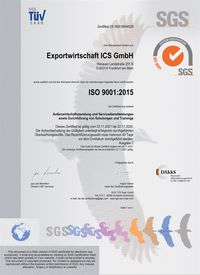More efficient organization of export control procedures in Germany
The Federal Ministry of Economics and Climate Protection (BMWK), in cooperation with the Federal Office of Economics and Export Control (BAFA), is planning far-reaching measures to strengthen and accelerate administrative processes in the area of export controls. The new regulations are intended to help make the licensing procedures for military equipment and dual-use goods to selected EU and NATO partners and close partner countries more efficient.
Under the planned measures, alliance and value partners will be supplied with armaments more quickly and easily, as decisions will no longer be made individually, but rather bundled together as so-called general orders. This will simplify administrative processes and concentrate control resources on the essentials. For other third countries, on the other hand, a case-by-case review remains in place to ensure targeted control.
State Secretary Sven Giegold emphasizes that the new regulations strike a balance between faster approval procedures for exporters and more in-depth checks with regard to human rights and the security situation. Companies will be able to export certain military equipment and dual-use goods directly to selected partner countries via general licenses without having to obtain specific individual licenses. However, the new regulations stipulate strict requirements, in particular the obligation to leave the goods in the recipient countries.
In order to ensure a balance between procedural acceleration and restrictive control, companies will be obliged to report their arms exports to the BAFA on the basis of general licenses. The planned measures, including the introduction of new general licenses and adjustments to existing regulations, will come into force on 1 August 2023.
In addition, certain notifications and information, such as zero notifications and the declaration of the person responsible for exports, will be extended to a term of two years in future in order to further reduce the administrative burden.
These comprehensive measures are intended to help speed up export control procedures, promote cooperation with alliance and value partners, and at the same time ensure targeted monitoring of third countries. The new regulations are expected to come into force on September 1, 2023.
You can read the full article from the Federal Office of Economics and Export Control (BAFA) here.
Source: Website of the Federal Office of Economics and Export Control (BAFA), accessed on 26.07.2023




